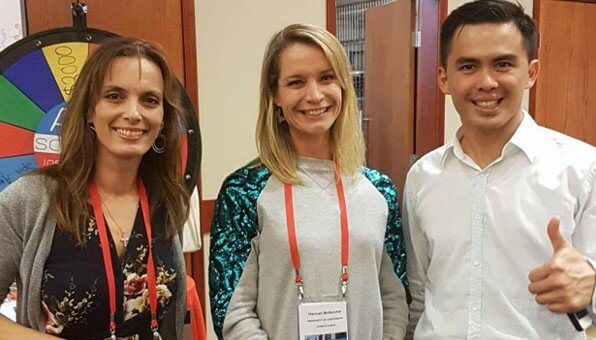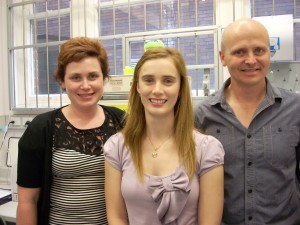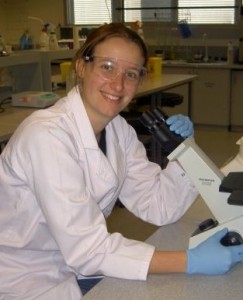SPIN TO WIN at Lorne Proteins 2017
ATA Scientific hosted the ‘SPIN TO WIN” Young Scientist prize once again at the annual Lorne Protein Structure and Function conference (5-9 Feb 2017). Delegates arrived at our booth in full optimism to spin the wheel and win. Many were awarded prizes such as wine, torches and lab timers. Still, the most popular and sought after prize on the board was our $2000 Young Scientist Award.
After a final nail-biting round and three finalists, our winner was announced.
Congratulations to Hannah McKerchar, PhD student from the University of Canterbury, School of biological sciences, Biochemistry – winner of the $2000 Travel Award ‘Spin to Win’ Prize!

“This award will enable me to present our research into crosslinks formed in processed food at international conferences and will provide an opportunity to connect and collaborate with others in the field”.
Hannah’s research team focuses on proteomics and mass spectrometry in food proteins. Her project looks at how crosslinks, that play a role in a protein’s structure, affect the function of protein after it is processed. Although crosslinking provides a means by which the food industry can manipulate the functional properties of food, many types of crosslinks are not well understood and there is no routine method of analysis. By investigating these crosslinks that form in food proteins, physical and chemical properties such as the texture, colour, flavour and nutritional value of food may be determined which will assist further understanding in food science processing, food assurance and food safety.
Hannah plans to use the $2000 award on attending future mass spectrometry and food science conferences to present data, share ideas and meet other people in the field. Two conferences that are of particular interest include the Australia and New Zealand Society for Mass Spectrometry Conference, being held in Adelaide on 16th to 20th of July 2017 and the American Society for Mass Spectrometry Annual Conference, 4-8 June 2017 in Indianapolis.
The ATA Scientific Young Scientist Travel Award, which was started in 2011, was set up to offer young scientists financial assistance to further their education and to attend scientific conferences and meetings around the world. The award is open to PhD candidates and/or scientists aged 30 years or younger. By setting an age limit we give early career scientists access to financial assistance to enable them to collaborate with peers at scientific meetings such as the Lorne Proteins conference, and to launch their careers within their field of study.
Over the past 5 years ATA Scientific have awarded the Young scientist travel prize to more than 45 winners from multiple Universities and research organisations around Australia and New Zealand. For more information regarding our award or to enter the next promotion contact us or visit https://www.atascientific.com.au/eventsandtraining/awards/
Contact usATA Scientific Travel Award Winners – Nov 2011

ATA Scientific would like to thank all those that participated in our recent Travel Award promotion held in October this year. Congratulations to our first prize winner Ms Amelia Edington, a PhD Pharmacology student earning her degree at the University of Sydney, under her supervisors A/Prof Renae Ryan and Prof Robert Vanderberg. Research in the Transporter Biology Group that Amelia is a member of, is focused on understanding the molecular basis for neurotransmitter transporter functions in the central nervous system and how this can be manipulated by endogenous regulators and pharmacological agents.
Excited to be awarded the prize, Amelia told ATA Scientific “It is fantastic to now have the opportunity to be able to attend a scientific meeting where I can present my research and meet other researchers in my field… Thank you so much”
The winning article submitted by Amelia was in response to our question “What I consider the most interesting or significant discovery/development during the 12 months in the field of science that I work”and is attached here.
In addition to our first prize winner, two runner up prizes were awarded. Congratulations to:
Jing Zhong LUK (PhD student, School of Chemistry and Molecular Biosciences, University of Queensland)Read article
Emma Rath (PhD Student, ANSTO National Deuteration Facility and University of Sydney, Faculty of Pharmacy) Read article
For more information or to stay informed of other upcoming promotions please ‘Like us” on Facebook or contact us.
Contact usATA Scientific Travel Award Winners – Feb 2012
This year, the decision for our Jan 2012 Travel Award winners was not an easy one with many great articles submitted. We would like to thank all those that participated. The next Travel Award for Feb/Mar 2012 is now open and available on our website. Please click here for further information.

Congratulations to our first prize winner Ms Celeste Donato, a PhD Scholar at Murdoch Childrens Research Institute, earning her degree from La Trobe University, under her supervisor A/Prof Carl Kirkwood. The Enteric Virus Research Group that Celeste is a member of investigates viral pathogens and their role in several gastrointestinal diseases important in children, including acute gastroenteritis and Crohn’s disease.
Excited to be awarded the prize, Celeste told ATA Scientific these funds will be used to assist her in attending the 11th International Symposium of double stranded RNA viruses to be held in November 2012.
The winning article submitted by Celeste was in response to our competition focused on an imaginary letter to the Minster for Science and is
attached here.
Congratulations to our second prize winner Ivan Wong (PhD student, School of Biotechnology and Biomolecular Sciences, The University of New South Wales; Supervisor Prof Brett Neilan ) Read article
For more information or to stay informed of other upcoming promotions please ‘Like us” on Facebook or contact us.
Contact usATA Scientific Travel Award Winners – Apr 2012
ATA Scientific would like to thank all those that participated in the Feb/Mar issue of our Travel Award promotion. After receiving an overwhelming response two winners were announced.

Congratulations to our first prize winner Miss Crystal Naudin, a second year PhD student with the Experimental Oncology unit at Newcastle University. Crystal works with her supervisor Dr Jude Weidenhofer, Research Fellow at the School of Biomedical Sciences & Pharmacy, University of Newcastle.
Researchers at the school that Crystal is a member of are primarily concerned with the study of cancer cell biology and the genetic basis of human diseases. Crystal is currently working on a family of cell membrane proteins called Tetraspanins. A recent mouse model generated in Crystal’s laboratory, in which one of the Tetraspanin genes (CD151) was knocked out, unexpectedly developed a severe early onset of kidney disease. As a result Crystal is working on determining the role of the CD151 molecule in kidney function.
When advised of her prize, Crystal told ATA Scientific“That is awesome. So excited. That should definitely cover registration and accommodation for the Tetraspanin conference!!“ This is the just the second time Crystal had entered one of our competitions. Crystal will present her work at the 5th European Tetraspanin Meeting in Nijmegen, The Netherlands from 26th-28th of September this year.
Congratulations to our second prize winner Fanny de Busserolles, PhD candidate at the School of Animal Biology (Neuroecology and Behaviour) and The Ocean Institute at the University of Western Australia. The group is involved in studying the sensory systems of a wide range of animals such as birds, reptiles, mammals, fish, sharks etc. Fanny’s research focuses on the visual system the lanternfish family, a family of deep-sea fish. Her work looks at gaining a better understanding of fish visual adaptations to their environment and in this particular case how the visual system of these species have adapted to see in dark conditions and for viewing biololuminescence in the deep-sea.
The prize money will be used towards Fanny attending the 2012 Australian Marine Science Society Association (AMSA) Conference (‘Marine Extremes and Everything in between’) to be held in Hobart in July 2012. Fanny will be talking about her exciting science on viewing bioluminescence by lanternfish in the deep-sea.
We would like to thank all those that participated. The next Travel Award for April/May 2012 is now available on our website.
For more information or to stay informed of other upcoming promotions please ‘Like us” on Facebook or contact us.
Contact usATA Scientific Travel Award winners – Jun 2012
ATA Scientific would like to thank all those that participated in the Apr/May issue of our Travel Award promotion.

Congratulations to our first prize winner Miss Bianca M. Blunden, PhD candidate at The University of New South Wales, School of Chemical Engineering, Centre for Advanced Macromolecular Design under her supervisor Prof Martina H.Stenzel.
Bianca’s project is primarily focused on the study of the attachment of ruthenium complexes to polymers. “We are aiming to develop macromolecular ruthenium complexes that are viable anti-cancer drugs.” Is it proposed that the attachment of these complexes to polymers will further increase their benefits as anticancer agents since diseased tissue has an endothelial layer of blood vessels that is more porous to large molecules and does not generally have a lymphatic drainage system.
Bianca plans to use her award to assist her in attending the 76th Prague Meeting on Macromolecules being held on 1−5 July 2012 and to help her cover the expenses for her current research exchange in Europe. Bianca is currently overseas in Germany testing the cell uptake efficiency of the ruthenium polymers.

Congratulations to our second prize winner Mr Matthew Leonard, PhD candidate at RMIT University, School Applied Sciences, Chemistry discipline, Organic synthesis group under his supervisor A/Prof.Helmut Hügel.
Matthew Gordon Research Conference 2012 2 21 300×279 ATA Scientific Travel Award winners Jun 2012His laboratory is dedicated to the study of fundamental chemical synthesis through the application and auspices of natural product based medicinal compounds. Matthew is in his second year of his PhD candidature researching novel green chemical syntheses of non steroidal antiandrogens such as RU 58841 and related novel structures that are effective for the treatment of alopecia (baldness), hirsutism (excessive hairiness in females) and acne. For example, RU58841 has a short half-life of less than 1h, therefore topical application not only avoids the extensive hepatic metabolism (N-dealkylation) but also provides for effective regional treatment without systemic antiandrogen activity due to the formation of active metabolite.
“Thank you so much, it means a lot to me to be recognized and supported in these kind of endeavours”, said Matthew upon receiving the news.
Matthew plans to use his prize money to attend the Gordon Research conference on Heterocyclic compounds in Newport, Rhode Island on 24-29 June 2012 and also to attend a scientific development meeting with Advion instruments in Ithaca, New York on 20-Jun-2012 to observe their new compact mass spectrometer.
We would like to thank all those that participated. The next Travel Award for Jun/Jul 2012 is now available on our website.
For more information or to stay informed of other upcoming promotions please ‘Like us” on Facebook or contact us.
Contact usTravel Award Winners – Aug 2012
ATA Scientific would like to thank all those that participated in the July/Aug issue of our Travel Award promotion.

Congratulations to our first prize winner Mr Joshua Smith, currently studying postgraduate Medicine at the University of Otago.
Joshua plans to complete an Honours year in Biomathematics at the University of Canterbury next year in order to investigate neural connectivity in the brain, and the autocatalytic networks of chemicals that lead to the first self-replicating cell (i.e. the origin of life). His research interests lie with the big questions in science – where do we come from, and what is it about a huge network of interconnected neurons that makes us capable of conscious experience?
“Mathematics is the language with which we study and model the world around us (and worlds distant from us in space or time). So it’s essential to learn to speak that language, in order to get your head around these big problems and make real progress”
Joshua plans to use his award to assist him to attend the New Zealand Phylogenetics Meeting (Doom13) that will be held in the central North Island (Mount Ruapehu) NZ, Feb 3-7, 2013. This will be an excellent opportunity for Joshua to meet some of the leading experts in this field. Phylogenetics is an important area of research, using mathematics to measure the similarities between genetic data from different species in order to generate evolutionary trees.
His supervisor Prof. Mike Steel (Director Biomathematics Research Centre, University of Canterbury) was pleased to hear of the award and expressed much praise for his talented and bright student.
“The conference fee plus accommodation and travel will equate approximately to the value of the award. I think this meeting would be an excellent opportunity for Josh, as many of our other graduate students have started their research careers at this meeting. Josh’s Honours project next year, under my supervision, will likely involve ideas that are related to the main theme of this conference” said Prof Mike Steel.
“Modern science is such a collaborative process: conferences like this are a really exciting opportunity to meet influential researchers in the field and learn about cutting-edge research. So, thanks ATA Scientific!” said Joshua.

Congratulations to our second prize winner Dr Thomas Klaric, based at the University of Adelaide, School of Medicine under his supervisor A/Prof. Simon Koblar, Stroke Research Programme, University of Adelaide.
After recently being awarded his PhD, Thomas is currently working on a number of different projects including a study into the effectiveness of dental pulp stem cell treatment in a mouse model of stroke. He is also continuing work from his PhD which focuses on the activity-dependent transcription factor Npas4 and its role in development and neuroprotection.
“I have been fortunate enough to have the opportunity to go to a few really good conferences… They are also a good place to exchange ideas and network with researchers in your field. But of course they can be very expensive which is why I’m always on the lookout for different travel grants and awards that I can apply for – every little bit helps!” said Thomas.
Thomas plans to use his prize money to attend the Combio2012 conference (23-27 Sept) in Adelaide and also to attend the Australian Health and Medical Research Congress (25-28 Nov) held in Adelaide, and the Australian Neuroscience Society meeting (3-6 Feb 2013) held in Melbourne.
We would like to thank all those that participated. The next Travel Award for Sept/Oct 2012 is now available on our website.
For more information or to stay informed of other upcoming promotions please ‘Like us” on Facebook or contact us.
Contact us



 02 9541 3500
02 9541 3500